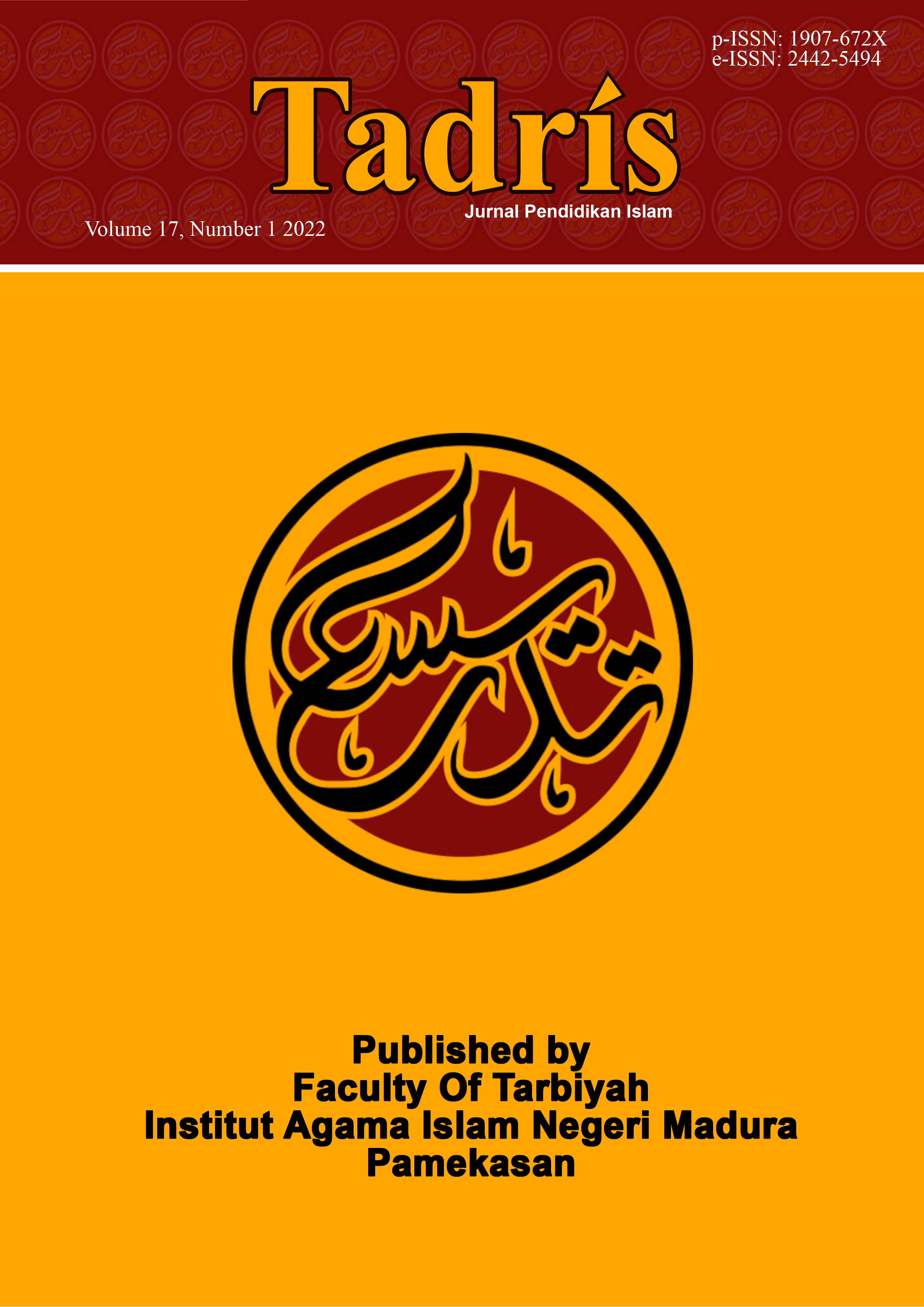Implementation Of Integrated Learning of Islamic Religious Education to Improve Student's Social Attitude Competence
 Abstract views: 415
,
Abstract views: 415
,
 PDF downloads: 350
PDF downloads: 350
Abstract
Downloads
References
Collie, R. J. (2019). The development of social and emotional competence at school: An integrated model. International Journal of Behavioral Development, 016502541985186. https://doi:10.1177/0165025419851864
Diana, R.R, Chirzin, M, Bashori, K, Suud, F.M., Khairunnisa, N Z. (2021). Parental Engagement On Children Character Education:The Influences Of Positive Parenting And Agreeableness Mediated By Religiosity. Cakrawala Pendidikan, 40(2), 428-444 https://doi:10.21831/cp.v40i2.39477
Damavandi, M. E., & Shekari Kashani, Z. (2010). Effect of mastery learning method on performance, attitude of the weak students in chemistry. Procedia - Social and Behavioral Sciences, 5, 1574–1579. https://doi:10.1016/j.sbspro.2010.07.327
Derevenskaia, O. (2014). Active Learning Methods in Environmental Education of Students. Procedia - Social and Behavioral Sciences, 131, 101–104. https://doi:10.1016/j.sbspro.2014.04.086
Fabra-Brell, E., & Romero-Naranjo, F. J. (2017). Social Competence between Equals through Body Percussion According to Method BAPNE in Secondary Students. Procedia-Social and Behavioral Sciences, 237, 829–836. https://doi:10.1016/j.sbspro.2017.02.179
Gagne, E.D.(1985). The Cognitive Psychology of School Learning. Boston, Toronto: Little, Brown and Company
Guimaraes, E. H. C., Dias, A. F. S., & França, J. B. S. (2019). Challenge of Implanting Educational Management Systems in Brazilian Schools. Advances in Human Factors and Systems Interaction, 594–602. https://doi:10.1007/978-3-030-20040-4_53
Idris, F., Yaacob, M., & Taha, M. (2012). Teaching and Learning methods of Ethnic Relations Course: Interactive or Destructive? Procedia - Social and Behavioral Sciences, 59, 105–109. https://doi:10.1016/j.sbspro.2012.09.252
Katuuk, Deitje Adolfien. (2014). Manajemen Implementasi Kurikulum: Strategi Penguatanimplementasi Kurikulum 2013. Cakrawala Pendidikan, 1, 13-24. https://doi:10.21831/cp.v1i1.1858
Komatsu, T. (2019). Integrated Schools and Social Cohesion in Postconflict Srebrenica: Bosniak Youths’ Views of Their Schooling Experiences. Comparative Education Review, 63(3), 398–417. https://doi:10.1086/704112
Magelinskaitė, Š., Kepalaitė, A., & Legkauskas, V. (2014). Relationship between Social Competence, Learning Motivation, and School Anxiety in Primary School. Procedia - Social and Behavioral Sciences, 116, 2936–2940. https://doi:10.1016/j.sbspro.2014.01.683
Mawdsley, A., & Willis, S. (2019). Exploring an integrated curriculum in pharmacy: Students’ perspectives on the experienced curriculum and pedagogies supporting integrative learning. Currents in Pharmacy Teaching and Learning. https://doi:10.1016/j.cptl.2019.02.006
Pinto, J. C., Taveira, M. do C., Candeias, A., Araújo, A., & Mota, A. I. (2012). Measuring Adolescents’ Perceived Social Competence in Career Education: A Longitudinal Study with Portuguese Students. Procedia - Social and Behavioral Sciences, 69, 271–278. https://doi:10.1016/j.sbspro.2012.11.409
Pop, O., Surianu, F. D., Deacu, A., Dobre, B., & Litcanu, M. (2015). Correlation between Learning Methods – Understanding Degree for Optimization Techniques in Power Systems Courses. Procedia - Social and Behavioral Sciences, 191, 568–573. https://doi:10.1016/j.sbspro.2015.04.630
Puspita, H. J. (2016a) "Implementasi Pembelajaran Tematik Terpadu Pada Kelas Vb Sd Negeri Tegalrejo 1 Yogyakarta", Jurnal Pendidikan Guru Sekolah Dasar.
Puspita, H. J. (2016b) "Implementasi Pembelajaran Tematik Terpadu", BASIC EDUCATION.
Prince, M. J., & Felder, R. M. (2006). Inductive Teaching and Learning Methods: Definitions, Comparisons, and Research Bases. Journal of Engineering Education, 95(2), 123–138. https://doi:10.1002/j.2168-9830.2006.tb00884
Ramdhani, M. A. (2014). Lingkungan Pendidikan dalam Implementasi Pendidikan Karakter. Jurnal Pendidikan Universitas Garut. Vol.08, 01 hal. 28-37
Sugiharto, R. (2017) "Pembentukan Nilai-Nilai Karakter Islami Siswa Melalui Metode Pembiasaan", Education : Jurnal Pendidikan Islam. https://doi:10.21111/Educan.V1i1.1299
Sutarto Hp, A. Jaedun, dan Nuryadin E.R. (2017). Nurturant Effects Of Scientific Approach Of Learning To Develop Student’s Spiritual And Social Attitudes. Cakrawala Pendidikan, 1, 44-56. https://doi:10.21831/cp.v36i1.12792
Svagzdiene, B., Jasinskas, E., Simanavicius, A., Bradauskiene, K., & Vveinhardt, J. (2015). Social Competence of Aesthetic Education of Sport Industry Managers: Fundamentality and Innovation Synergies. Procedia - Social and Behavioral Sciences, 197, 348–353. https://doi:10.1016/j.sbspro.2015.07.148
Syafruddin. (2016) . Kepala MIN1 Tanah Datar
Uba, I., Hassan, S. A. B., Mofrad, S., Abdulla, R., & Yaacob, S. N. (2012). Redefining Social Competence and its Relationship with Authoritarian Parenting. Procedia - Social and Behavioral Sciences, 46, 1876–1880. https://doi:10.1016/j.sbspro.2012.05.395
Worawuth, P., Prayuth, C., Kanokorn, S., Udomporn, K., Chadchawarn, A., & Wilawan, P. (2014). Integrated Learning Teacher Professional Development in Primary Schools. Procedia - Social and Behavioral Sciences, 112, 775–780. https://doi:10.1016/j.sbspro.2014.01.1229
Copyright (c) 2022 TADRIS: Jurnal Pendidikan Islam

This work is licensed under a Creative Commons Attribution-NonCommercial 4.0 International License.
The journal operates an Open Access policy under a Creative Commons Non-Commercial 4.0 International license. Authors who publish with this journal agree to the following terms:
- Authors retain copyright and grant the journal right of first publication with the work simultaneously licensed under a
 Commons Attribution-NonCommercial 4.0 International License
Commons Attribution-NonCommercial 4.0 International Licensethat allows others to share — copy and redistribute the material in any medium or format, and adapt — remix, transform, and build upon the material.
- Authors are able to enter into separate, additional contractual arrangements for the non-exclusive distribution of the journal's published version of the work (e.g., post it to an institutional repository or publish it in a book), with an acknowledgement of its initial publication in this journal.
- Authors are permitted and encouraged to post their work online (e.g., in institutional repositories or on their website) prior to and during the submission process, as it can lead to productive exchanges, as well as earlier and greater citation of published work (see The Effect of Open Access).














